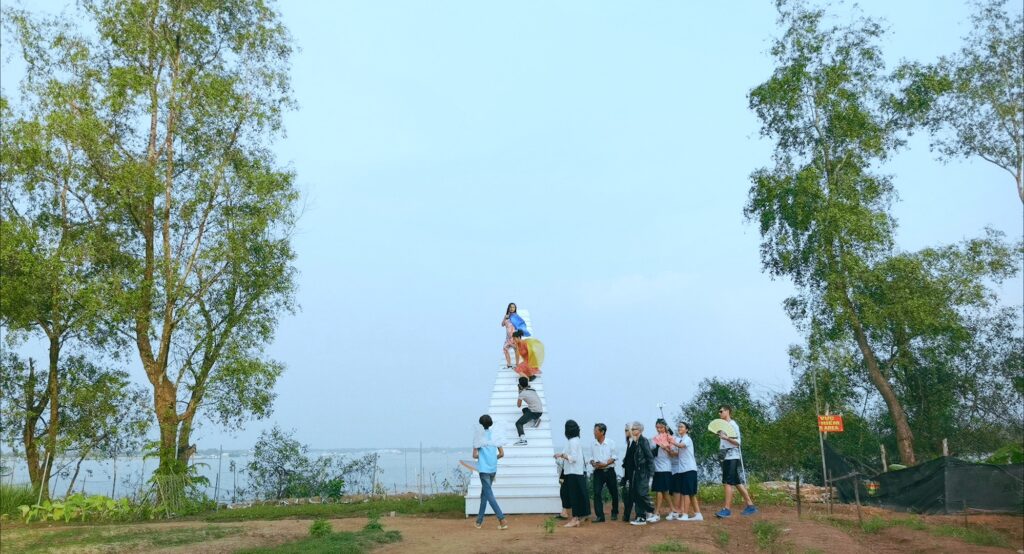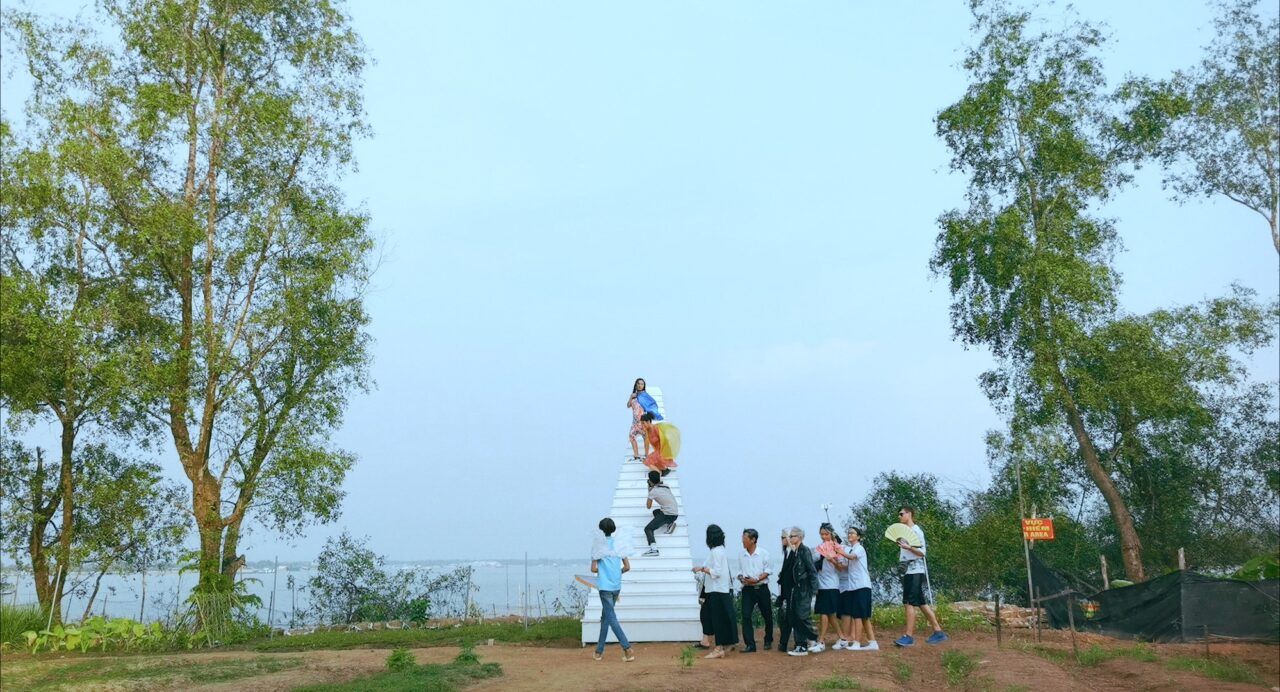The Stories We Tell Ourselves
By Daryl Li

A Trip To Heaven
Vietnam / 2020 / 15 min / Vietnamese
Director: Duong Dieu Linh
At SGIFF 2020, Southeast Asian Short Film Competition, Programme 4
A Trip to Heaven is a contemplation of unfulfilled wishes and fantasies in the greater narrative of life. In this short film directed by Duong Dieu Linh, fifty-year-old Madam Tam embarks on a heaven-themed bus tour with her friend, travelling to the Mekong Delta. As they board the bus, they encounter Madam Tam’s high school sweetheart, prompting fantasies of reconciliation as she reminisces about the love that could have been. She often stares wistfully into space, breaking into a smile or looking at him admiringly. Given Madam Tam’s age and her nostalgic inclinations, this prospect of love carries the tinge of regret.
Madam Tam’s romantic sentiments often set her up for disappointment, or end in instances of deflating humour. Sitting with her sweetheart on a boat down the river, Madam Tam’s attempts at enjoying the experience are ruined by his warnings about crocodiles in the water and worms in the water coconut. As she poses for a photo with a large python, he walks rudely into frame, exclaiming about the snake before making a remark about the toilets. When Madam Tam dedicates a performance of a love song to her sweetheart, the film cuts from her sincere plea to her sweetheart, who is fast asleep.
This pattern of disappointment is mirrored in the comically dissatisfying tour experience. Guided bus tours purport to offer authentic experiences but often have a commercial slant and feature a gamut of stereotypical activities—in this case, a boat ride, a python activity, a photo spot, and a campfire. The guide arrives wearing synthetic wings, a gesture towards the manufactured nature of the tour. Moreover, the other participants in the tour are character clichés. There is a group of excited schoolgirls on perhaps their first trip together, a couple so much in love they ignore almost everyone else, and a stereotypical foreign tourist. Participants are armed with professional cameras or selfie sticks, eagerly snapping away to capture their memories. There is a banality to it, in the trite expressions, all-too-familiar actions of the characters, and the lack of energy in the scenes. The group shuffles from one clichéd activity to another in search of something authentic and memorable. Compacted together, the hollowness and repetitiveness of such tourist experiences comes sharply into focus, and rarely do they live up to their promise.
A Trip to Heaven contemplates unrealised hopes within the broader context of life. From the film’s title to the theming of the tour, references to heaven are constantly made. Most notably, a major feature of the tour is a stairway ascending towards the open sky. Through Tam’s quest for reconciliation, A Trip to Heaven traces a connection between this romantic quest and the afterlife, reflecting more broadly on the greater arc of life and our unfulfilled wishes.

A Trip to Heaven is a contemplation of unfulfilled wishes and fantasies in the greater narrative of life. In this short film directed by Duong Dieu Linh, fifty-year-old Madam Tam embarks on a heaven-themed bus tour with her friend, travelling to the Mekong Delta. As they board the bus, they encounter Madam Tam’s high school sweetheart, prompting fantasies of reconciliation as she reminisces about the love that could have been. She often stares wistfully into space, breaking into a smile or looking at him admiringly. Given Madam Tam’s age and her nostalgic inclinations, this prospect of love carries the tinge of regret.
Madam Tam’s romantic sentiments often set her up for disappointment, or end in instances of deflating humour. Sitting with her sweetheart on a boat down the river, Madam Tam’s attempts at enjoying the experience are ruined by his warnings about crocodiles in the water and worms in the water coconut. As she poses for a photo with a large python, he walks rudely into frame, exclaiming about the snake before making a remark about the toilets. When Madam Tam dedicates a performance of a love song to her sweetheart, the film cuts from her sincere plea to her sweetheart, who is fast asleep.
This pattern of disappointment is mirrored in the comically dissatisfying tour experience. Guided bus tours purport to offer authentic experiences but often have a commercial slant and feature a gamut of stereotypical activities—in this case, a boat ride, a python activity, a photo spot, and a campfire. The guide arrives wearing synthetic wings, a gesture towards the manufactured nature of the tour. Moreover, the other participants in the tour are character clichés. There is a group of excited schoolgirls on perhaps their first trip together, a couple so much in love they ignore almost everyone else, and a stereotypical foreign tourist. Participants are armed with professional cameras or selfie sticks, eagerly snapping away to capture their memories. There is a banality to it, in the trite expressions, all-too-familiar actions of the characters, and the lack of energy in the scenes. The group shuffles from one clichéd activity to another in search of something authentic and memorable. Compacted together, the hollowness and repetitiveness of such tourist experiences comes sharply into focus, and rarely do they live up to their promise.
A Trip to Heaven contemplates unrealised hopes within the broader context of life. From the film’s title to the theming of the tour, references to heaven are constantly made. Most notably, a major feature of the tour is a stairway ascending towards the open sky. Through Tam’s quest for reconciliation, A Trip to Heaven traces a connection between this romantic quest and the afterlife, reflecting more broadly on the greater arc of life and our unfulfilled wishes.


